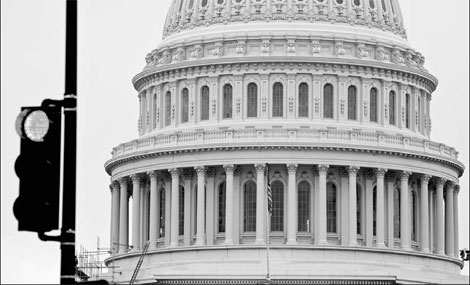Failure to produce budget deal threatens US recovery
Updated: 2011-11-23 08:06
(China Daily)
|
|||||||||
|
The US Capitol, the meeting place of the US Congress. The budget committee's inability to compromise will trigger $1.2 trillion in automatic spending cuts. However, Congress has succeeded in the past in undoing debt-reduction enforcement measures. Joshua Roberts / Bloomberg |
Ratings agencies reaffirm country's credit status, economic outlook
WASHINGTON - The implosion of the congressional supercommittee is likely to delay any major deficit-reduction agreement until after the next presidential election and may pose an immediate threat to the struggling US economy.
The committee's failure to reach a deal means several tax programs, including a payroll tax holiday, risk expiring at the beginning of next year, weighing on the household spending that accounts for about 70 percent of the world's largest economy.
The panel's inability to agree on $1.2 trillion in budget cuts, which drove stocks down on Monday and Treasuries higher, also stoked doubts about US lawmakers' ability to overcome partisan gridlock and safeguard the nation's fiscal health.
"They could not agree even on the smaller challenge of $1.2 trillion," said former White House budget director Alice Rivlin, among a coalition of officials who pushed the panel to "go big" and find $4 trillion in savings, in an e-mail. "I do not see a way to get to the big deal before the election, if then. It is really discouraging!"
Still, Standard & Poor's reaffirmed it would keep the US credit rating at AA+ after stripping the government of its top AAA grade on Aug 5.
Moody's Investors Service reaffirmed its AAA rating with a negative outlook.
Fitch Ratings noted in a statement that it said in August that a supercommittee failure would probably result in a "negative rating action", likely a revision of its outlook to negative, and that a review would be concluded by the end of this month.
Trigger in jeopardy

S&P said its rating would stand because the committee's failure triggers $1.2 trillion in automatic spending cuts, which were put in place in the event no compromise could be reached.
Easing those automatic spending limits may cause "downward pressure on the ratings", S&P said in a statement.
That so-called trigger may be in jeopardy, with US politicians leery of steep cutbacks at the Pentagon that US Defense Secretary Leon Panetta has called "draconian". Congress has succeeded in the past in undoing debt-reduction enforcement mechanisms.
"They have to really be careful not to mess with that," said Robert Bixby, head of the Concord Coalition, which presses for debt reduction. "To dismantle it would be totally unacceptable."
Economic risk
Investors have largely shrugged off S&P's August downgrade of US debt to AA+ from AAA. After the move by the ratings company, the government's borrowing costs fell to record lows as Treasuries rallied.
Trouble may lie ahead for the economy. The supercommittee was considering rolling into its final product expiring tax provisions that must now be addressed before January.
Impairing growth
Earlier this year, the US Congressional Budget Office (CBO) estimated that US debt will reach 187 percent of GDP by 2035. Even after the trigger takes effect, the debt will grow to between 134 percent and 164 percent of GDP in 2035, according to the Peter G. Peterson Foundation, which works to focus public attention on the US' fiscal deficit.
"History suggests that a debt-to-GDP ratio of more than 60 to 90 percent can impair economic growth and produce crises," Peterson said in a statement.
Reductions
If lawmakers' efforts to reverse the automatic defense cuts fail, the Defense Department's budget would face reductions of about $1 trillion over a decade, the most of any department.
The Pentagon already is cutting about $450 billion from its budget over the next decade as a result of the Budget Control Act that US President Barack Obama signed into law on Aug 2, the same measure that created the supercommittee.
The panel's failure to reach an agreement increases the defense cuts by about $500 billion, excluding interest savings, starting in January 2013.
The CBO estimates 71 percent of the cuts would come from programs such as education, the environment, transportation, housing assistance and veterans' health care.
Bloomberg News
(China Daily 11/23/2011 page16)












